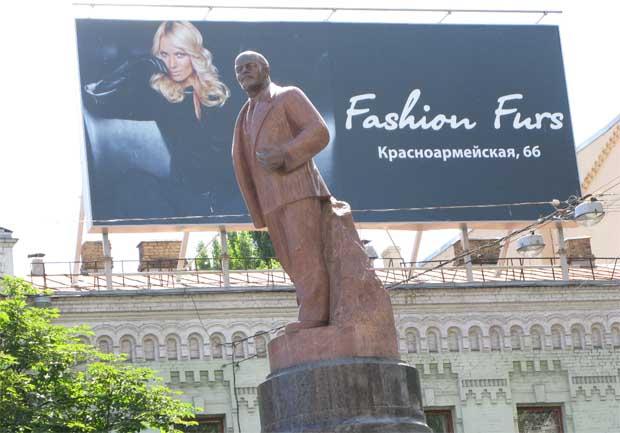In post-Soviet Russia, a quest to define national identity
Soviet and post Soviet reality in Kiev, Ukraine. (Photo by Brigid McCarthy.)
For the past decade, Russian television has been broadcasting a weekly series called “Who Are We?”
Each 30-minute episode looks at a particular thread in Russian history, from the role of the secret police to Russian-Georgian relations to Russia and Judaism. The series is really about self-understanding, said Felix Razumovsky, the bearded, burly historian who hosts “Who Are We?” Normal countries don’t have to ask themselves this question, he added.
“But Russia is a peculiar country, with a very strange fate,” Razumovsky said.
Russian history is characterized by dramatic ruptures — tears, he said, in the historical canvas. The Bolshevik Revolution and the end of Imperial Russia in 1917 being just one.
“Of course, another tear in the historic canvas was 1991, and the end of the Soviet Union,” he said.
Razumovsky said the Soviet Union didn’t break apart 20 years ago — Russia did.
“Again, there was this attempt to recreate Russia from scratch, by denying everything that came before, everything Soviet,” he said.
Razumovsky wants Russians to understand this impulse for revolution and radical reinvention, because the results are so often tragic.
“It’s like, if you get your hands dirty, instead of washing them, you just cut them off,” he said. “I’m a big believer in washing.”
He said political, economic and cultural factors help explain Russia’s extremist tendencies.
“But as someone who studies the history of this country, it’s the spiritual level or the inner workings of the nation that I find interesting,” he said.
Psychologically, Razumovsky said, Russians remain profoundly shaped by their Orthodox Christian heritage, and the idea of “Holy Russia.” That heritage can be summed up in a single Biblical verse.
Don’t gather your treasures on earth, but store up your treasures in heaven.
“This very simple phrase is basically what characterizes the Russian soul or spirit,” Razumovksy said. “Everyone in Russia is still pretty much this way, even if they try to hide it.”
Razumovsky thinks one reason Communist ideology got a foothold in Russia was it offered a modern, secular version of Holy Russia. Soviets were ready to lay down their lives for the sake of a future, workers’ paradise.
“So that’s why Russia took up the call. Excuse me, but no one else in Europe screwed around like this,” he said, with a laugh.
When Communism collapsed 20 years ago, Russians not only lost their state religion, they lost their Soviet identity. According to Razumovsky, this is the real crisis in Russia today: there’s no agreement among the population about the country’s post-Soviet identity.
But the Russian Orthodox Church has made a startling comeback over the past 20 years, a trend that’s been encouraged by Prime Minister Vladimir Putin and other political leaders. More than 80 percent of Russians consider themselves Orthodox Christians, even if they don’t attend church. Razumovksy thinks this transition from militant atheism to Orthodoxy makes perfect sense.
“It’s the same type of world view. If you’re a person who needs that bigger force or idea in your life, then it’s easier for you to switch from the Bolshevik/Communist future paradise to the Orthodox Christian future paradise,” he said.
But some view Russia’s religious revival with skepticism. Valery Khazin, a writer from Nizhniy Novgorod, said he has friends who used to be active members of the Communist Party.
“Now they’re carrying small crosses. At the same time, they toast the Soviet holidays, drink vodka, in the same way they did 20 to 25 years ago,” Khazin said,
Razumovsky said this kind of muddled thinking is typical. Just look at Russia’s national symbols. The flag is from imperial Russia, he noted, while the national anthem is from the Soviet era, except that it now begins with “Russia our Holy Nation.”
We should neither romanticize, nor reject our past, he said. We should learn from it.
“Russians have this unique experience of having lived through so many different kinds of rule, and forms of the nation state, and that’s a treasure that can be used,” Razumovsky said.
But for now, he said, history still has Russia by the throat.
